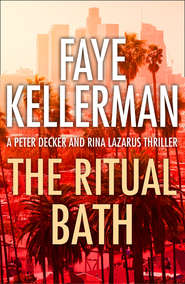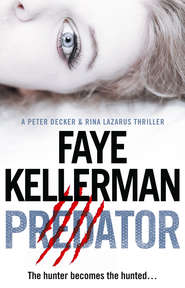По всем вопросам обращайтесь на: info@litportal.ru
(©) 2003-2024.
✖
The Forgotten
Настройки чтения
Размер шрифта
Высота строк
Поля
Chapter 23
Chapter 24
Chapter 25
Chapter 26
Chapter 27
Chapter 28
Chapter 29
Chapter 30
Chapter 31
Chapter 32
Chapter 33
Chapter 34
Chapter 35
Chapter 36
Chapter 37
Chapter 38
Acknowledgments
Keep Reading
About the Author
Faye Kellerman booklist
About the Publisher
1 (#u0f746847-02e6-5495-8ba5-4f5ec129c6fa)
The call was from the police. Not from Rina’s lieutenant husband, but from the police police. She listened as the man spoke, and when she heard that it had nothing to do with Peter or the children, she felt a “Thank you, God” wave of instant relief. After discovering the reason behind the contact, Rina wasn’t as shocked as she should have been.
The Jewish population of L.A.’s West Valley had been rocked by hate crimes in the past, culminating in that hideous ordeal a couple of years ago when a subspecies of human life had gotten off the public bus and had shot up the Jewish Community Center. The center had been and still was a refuge for all people, offering everything from toddler day camps to dance movements to exercise classes for the elderly. Miraculously, no one had been killed—there. But the monster—who had later in the day committed the atrocious act of murder—had injured several children and had left the entire area with numbing fears that maybe it could happen again. Since then, many of the L.A. Jews took special precautions to safeguard their people and their institutions. Extra locks were put on the doors of the centers and synagogues. Rina’s shul, a small rented storefront, had even gone so far as to padlock the Aron Kodesh—the Holy Ark that housed the sacred Torah scrolls.
The police had phoned Rina because her number was the one left on the shul’s answering machine—for emergencies only. She was the synagogue’s unofficial caretaker—the buck-stops-here person who called the contractors when a pipe burst or when the roof leaked. Because it was a new congregation, its members could only afford a part-time rabbi. The congregants often pitched in by delivering a Shabbos sermon or sponsoring an after-prayer kiddush. People were always more social when food was served. The tiny house of worship had lots of mettle, and that made the dreadful news even harder to digest.
Driving to the destination, Rina was a mass of anxiety and apprehension. Nine in the morning and her stomach was knotted and burning. The police hadn’t described the damage, other than use the word vandalize over and over. From what she could gather, it sounded more like cosmetic mischief than actual constructional harm, but maybe that was wishful thinking.
She passed homes, stores, and strip malls, barely glancing at the scenery. She straightened the black tam perched atop her head, tucking in a few dangling locks of ebony hair. Even under ordinary circumstances, she rarely spent time in front of the mirror. This morning, she had rushed out as soon as she hung up the phone, wearing the most basic of clothing—a black skirt, a white long-sleeved shirt, slip-on shoes, a head covering. At least her blue eyes were clear. There had been no time for her makeup; the cops were going to see the uncensored Rina Decker. The red traffic lights seemed overly long, because she was so antsy to get there.
The shul meant so much to her. It had been the motivating factor behind selling Peter’s old ranch and buying their new house. Because hers was a Sabbath-observant Jewish home, she had wanted a place of worship that was within walking distance—real walking distance, not something two and a half miles away as Peter’s ranch had been. It wasn’t that she minded the walk to her previous shul, Yeshivat Ohavei Torah, and the boys certainly could make the jaunt, but Hannah, at the time, had been five. The new house was perfect for Hannah, a fifteen-minute walk, plus there were plenty of little children for her to play with. Not many older children, but that didn’t matter, since her older sons were nearly grown. Shmueli had left for Israel, and Yonkie, though only in eleventh grade, would probably spend his senior year back east, finishing yeshiva high school while simultaneously attending college. Peter’s daughter, Cindy, was now a veteran cop, having survived a wholly traumatic year. Occasionally, she’d eat Shabbat dinner with them, visiting her little sister—a thrill since Cindy had grown up an only child. Rina was the mother of a genuine blended family, though sometimes it felt more like genuine chaos.
Her heartbeat quickened as she approached the storefront. The tiny house of worship was in a building that also rented space to a real estate office, a dry cleaners, a nail salon, and a take-out Thai café. Upstairs were a travel agency and an attorney who advertised on late-night cable with happy testimonials from former clients. Two black-and-white cruisers had parked askew, taking up most of the space in the minuscule lot, their light bars alternately blinking out red and blue beams. A small crowd had gathered in front of the synagogue, but through them, Rina could see hints of a freshly painted black swastika.
Her heart sank.
She inched her Volvo into the lot and parked adjacent to a cruiser. Before she even got out of the car, a uniform was waving her off. He was a thick block of a man in his thirties. Rina didn’t recognize him, but that didn’t mean anything because she didn’t know most of the uniformed officers in the Devonshire station. Peter had transferred there as a detective, not a patrol cop.
The officer was saying, “You can’t park here, ma’am.”
Rina rolled down the window. “The police called me down. I have the keys to the synagogue.”
The officer waited; she waited.
Rina said, “I’m Rina Decker, Lieutenant Decker’s wife …”
Instant recognition. The uniformed officer nodded by way of an apology, then muttered, “Kids!”
“Then you know who did it?” Rina got out of the car.
The officer’s cheeks took on color. “No, not yet. But we’ll find whoever did this.”
Another cop walked up to her, this one a sergeant by his uniform stripes, with Shearing printed on his nametag. He was stocky with wavy, dishwater-colored hair and a ruddy complexion. Older: mid to late fifties. She had a vague sense of having met him at a picnic or some social gathering. The name Mike came to mind.
He held out his hand. “Mickey Shearing, Mrs. Decker. I’m awfully sorry to bring you down like this.” He led her through the small gathering of onlookers, irritated by the interference. “Everybody … a couple of steps back … Better yet, go home.” Shouting to his men, “Someone rope off the area, now!”
As the lookie-loos thinned, Rina could see the exterior wall—one big swastika, a couple of baby ones on either side. Someone had spray-painted Death to the Inferior, Gutter Races. Angry moisture filled her eyes. “Is the door lock broken?” she asked the sergeant.
“’Fraid so.”
“You’ve been inside?”
“Unfortunately, I have. It’s …” He shook his head. “It’s pretty strong.”
“My parents were concentration-camp survivors. I know this kind of thing.”
He raised his eyebrow. “Watch your step. We don’t want to mess up anything for the detectives.”
“Who’s being brought in?” Rina said. “Who investigates hate crimes?” But she didn’t wait for an answer. As she stepped across the threshold, she felt her muscles tighten, and her jaw clenched so hard it was a wonder that her teeth didn’t crack.
All the walls had been tattooed with one vicious slogan after another, each derogatory, each advocating different ways to exterminate Jews. So many swastikas, it could have been a wallpaper pattern. Eggs and ketchup had been thrown against the plaster, leaving behind vitreous splotches. But the walls weren’t the worst part, minor compared to the holy books that had been torn and shredded and strewn across the floor. And even the sacrilege of the religious tomes and prayer books wasn’t as bad as the horrific photographs of concentration-camp victims that lay atop the ruined Hebrew texts. She averted her eyes but had already seen too much—ghastly black-and-white snapshots depicting individual bodies with tortured faces and gaping mouths. Some were clothed, some nude.
Shearing was staring, too, shaking his head back and forth, while uttering “Oh man, oh man” under his breath. He seemed to have forgotten about her. Rina cleared her throat, partially to break Mickey’s trance, but also to stave back tears. “I suppose I should look around to see if anything valuable is missing.”
Mickey looked at Rina’s face. “Uh, yeah. Sure. Did the place have anything valuable …? I mean, I know the books are valuable, but like flashy valuable things. Like silver ecumenical things … is ‘ecumenical’ the right word?”











